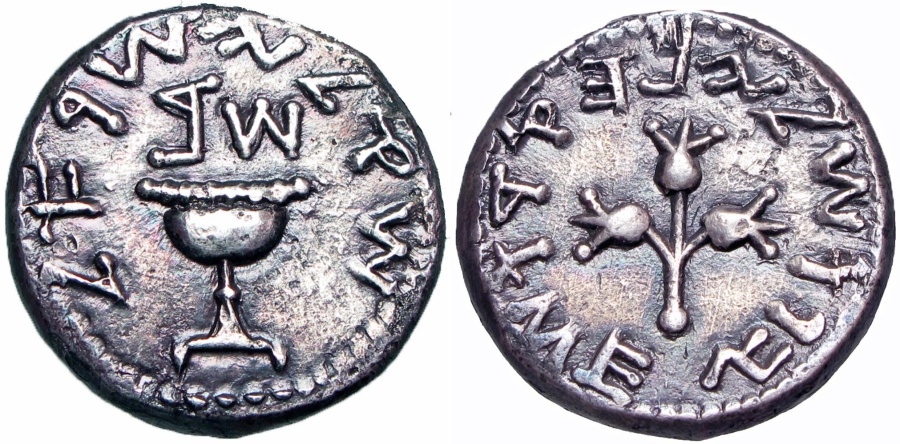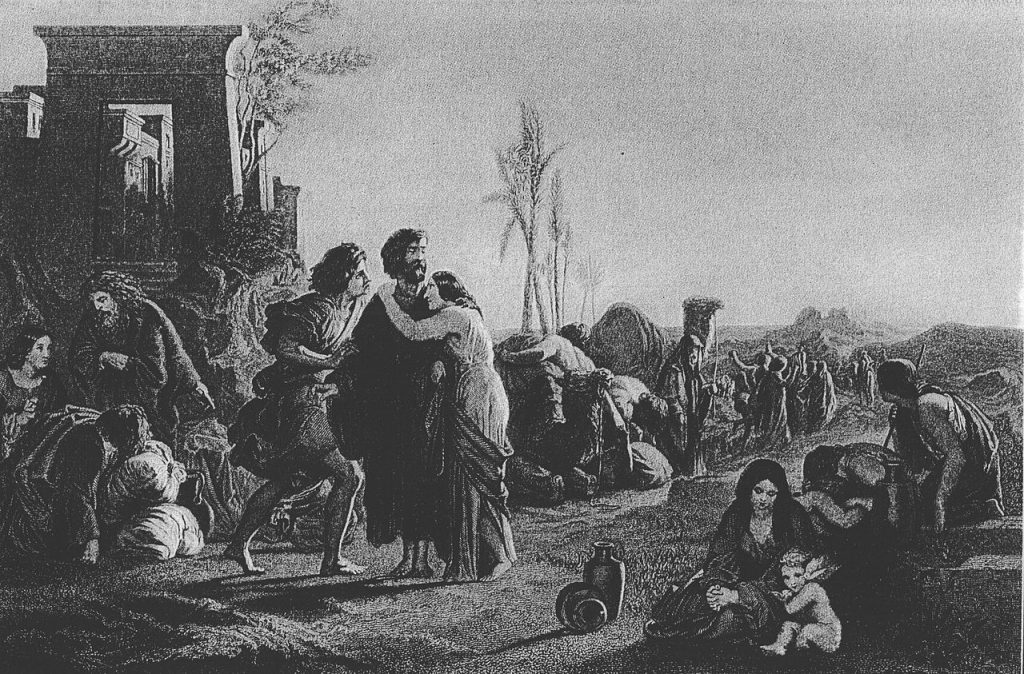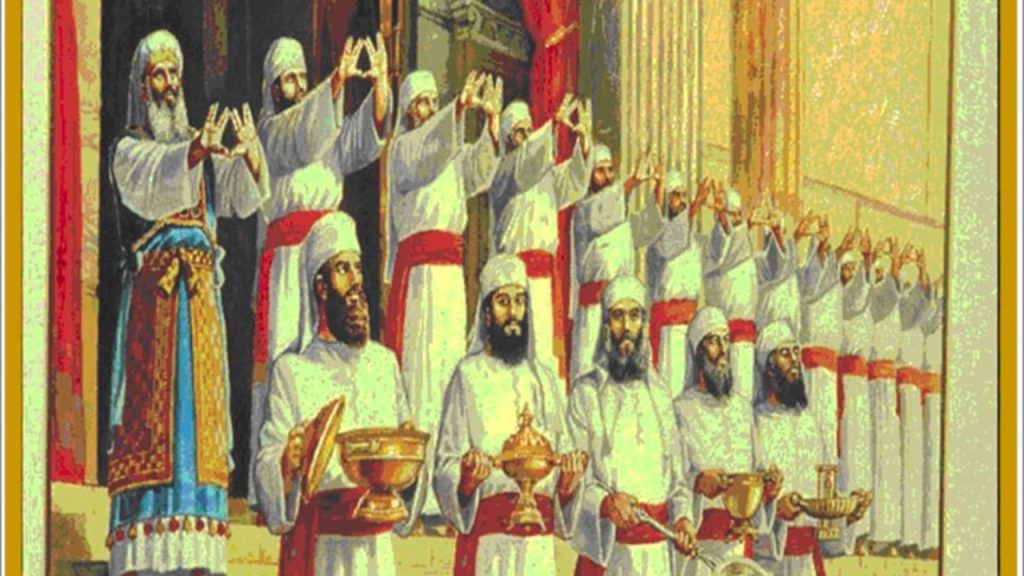We often speak of miracles such as the splitting of the Red Sea and the Jordan River, the ten plagues and Elijah’s wonders, but we forget to mention this miracle which occurs in the Land of Israel every seventh year! This week’s Torah reading talks of the prohibition against performing agricultural work during the Shmitah (Sabbatical) year. Who would have thought a year ago, that we will be able to financially survive, taking an unpaid leave of absence from work for an entire year?! true, it would take years for the economy to lift itself out of the shambles, but a miracle happened.
BeHar
Parasht Behar (Sinai) “On the Mountain” of Sinai, which opens with the mitzvah of Shmitah, begins with the words “And G-d spoke to Mosheh on Mount Sinai.” Pirkei Avot states that “Mosheh received the Torah from Sinai” the entire Torah was given to Mosheh at Sinai. Why is it important?
Mount Sinai
The Talmud tells us that when G-d wanted to give the Torah, a number of tall mountains wished that G-d will give the Torah on them. Each mountain boasted about it’s height and greatness. G-d chose Sinai, the smallest and humblest of all those mountains. If G-d wanted to teach us about humility, He should have given the Torah in a valley? The first paragraph in Shulchan Aruch, speaks about the importance of serving G-d with pride. Being humble like Sinai, and yet be proud like a mountain. (Based on Likkutei Sichot, vol.1 p.276)
In a nutshell

G‑d communicates to Mosheh the laws of the Sabbatical year: every seventh year, all work on the land should cease, and its produce becomes free for the taking for all, man and beast, as well as the Jubilee year every 50 years on which work on the land ceases, servants are set free, and all ancestral estates in the Holy Land that have been sold revert to their original owners. Additional laws governing the sale of lands, and the prohibitions against fraud and usury, are also given. According to Rashi, the word yovel translates as “ram’s horn.” This special year was first announced by a blast of a ram’s horn ( shofar) during Yom Kippur of that year across the land of Israel. The year of liberty had begun! The order of blessings and blasts of the shofar were the same as on Rosh Hashanah.
In leap years (2022, 2024, 2027), parashah Behar is read separately. In common years (2020, 2021, 2023, 2025, 2026), parashah Behar is combined with the 10th and last in the Book of Leviticus, Parashat Bechukotai.
BeChukotai
In Parashat Bechukotai G‑d promises that if the people of Israel will keep His commandments, they will enjoy material prosperity ”If you follow My laws and faithfully observe My commandments, I will grant rain so that the earth shall yield its produce and the trees their fruit. I will grant peace and you shall sleep with no fear. I will cause vicious beasts to withdraw from the land and your enemies will fall before you.” However, it is conditional. A harsh rebuke warning them with a long list of punishments that will be inflicted on the Israelites if they do not follow God’s laws; exile, persecution and other evils that will befall them if they abandon their covenant with Him. The Parshah concludes with a specified funding system of annual mandatory donations in order to maintain and sustain the sanctuary.

Shmitah
This week’s Torah reading talks of the prohibition against performing agricultural work during the Shemittah (Sabbatical) year, which didn’t apply to the Levites (who owned no property) and the slaves who remained with their master. We often speak of miracles such as the splitting of the Red Sea and the Jordan River, the ten plagues and Elijah’s wonders, but we neglect to mention the miracle which occurs in the Land of Israel every seventh year! Shmitah teaches us that we have the ability to trust in G‑d. And He, in turn, has the ability to provide for those who do so. For centuries, every sixth year the crop would be so abundant that it lasted for three years for those who were committed to abstain from work on the seventh.
The Year 5782
The year 5782 since creation (September 7, 2021 – September 25, 2022) is a Shmitah year.
Like Shabbat, the seventh day of the week is holy, every seventh year is holy. The Shmitah (Sabbatical) year is a year devoted to strengthening our bond with G‑d to desist from planting two years in a row was an act of supreme faith, for which G‑d promised a special bounty in year 48.
The Counting 49 days / 49 years
The Counting the Omer was Announced Via Shofar Blast. Like the 49 days of the Omer, the 49 years leading up to the Yovel were counted. However, each Jew is obligated to count the Omer individually, while the Great Beth Din in Jerusalem would count the years on behalf of the whole nation. For example, in the eighth year of the cycle, they would say: “Blessed is the L‑rd our G‑d, King of the Universe, who commanded us to count the Shemittah and Yovel. This year is eight years, which are one Shemittah and one year to the Yovel . . .”
Yovel
In Parashat BeHar, we read “You shall sanctify the 50th year and proclaim freedom throughout the land for all of its inhabitants; it shall be the Jubilee year (Yovel) for you.” The Yovel (Jubilee) Occurred Once in 50 Years. While the Sabbatical year (Shmitah) occurred every seven years, at the end of seven cycles of seven years (49 years) the nation would celebrate the Yovel. Since the Jubilee followed a Sabbatical year (year 49), that meant two years in a row without planting.
How long is Forever?
The Torah Shebichtav (Written Law) without Torah Sheba’al Peh (Oral Law) is likened to a body without a soul. Contradictions between the two may cause cognitive dissonance, which may challenge our belief system. The Torah teaches that a Jewish servant works a six-year period of service. At the seventh year, if the servant shall say, ‘I love my master…I don’t [want to] go free,’ then his master shall bring him to the court…and he shall serve him forever (le’olam).”
“The reinterpretation of the term “forever” encourages us to strive for new realities within our own lifetimes”-Rabbi Asher Brander
The 50 Year cycle

Each seven-year shmitah (sabbatical) cycle represents a rung, a new level achieved within the world while Yovel, which follows the seventh shmitah year, represents the dawn of a completely new world. In the Torah Sheba’al Peh, the term “forever” (le’olam) means until Yovel. Rabbeinu Bechayei (late 13th-century Spain) cites the Kabbalists who say that 50 represents the circle of life. He translates Yovel as “rivulet” (small stream of water), which refers to the idea that during Yovel, everything flows back to its original source.
In 50 days, the Jewish people were transformed from a nation of slaves to recipients of the Torah. We attempt that same metamorphosis each year during Sefirat Ha’Omer as we count off 50 days from Passover to Shavuot. Similarly, the Levite may only serve in the Beit Hamikdash (Temple) until the age of 50.
The Abarbanel offers an interesting insight into the idea of a 50-year cycle. He says that the main focus of an individual during his/her average of 50 years of work-life is to make a living. He traces the word yovel to bliya, which means “to worn-out” and argues that after 50 years of working, one’s energy should “fade” from physicality and should instead be directed toward his spiritual growth.
Ramban (Nachmanides) translates Yovel as “freedom,” which likewise refers to the freeing of the slaves. says: “The enlightened one will understand that ‘forever’ (le’olam) is literal–for one who works until Yovel has worked all the days of the world (olam), a Jew need not die in order to arrive at a new world; rather, he can transcend worlds in his lifetime.
Ibn Ezra (12th-century Spanish commentator), translates yovel as “sending away,” which refers to the sending away of slaves. cites a verse from Kohelet (Ecclesiastes) which implies that the world olam can mean a period of time. Since Yovel is the longest block of time in the Jewish calendar, the word olam, taken in the sense of “a long time” is appropriate.
When Is the Next Jubilee Year?
The Jubilee year is currently not observed or commemorated. According to biblical law, the Jubilee is only observed when all twelve tribes of the Jewish nation are living in Israel, “And you shall sanctify the fiftieth year, and proclaim freedom throughout the land for all who live on it,” are in the Land of Israel.
In the 6th century BCE, the Assyrians conquered the Northern Kingdom of Israel and sent the majority of its population into exile, the required condition for the Jubilee to be sanctified was lost. Those who were deported are historically known as the Ten Lost Tribes. Thus, the last time there was a biblical requirement to observe the Jubilee was about 150 years before the destruction of the First Temple.
With the destruction of the Second Temple and the disbandment of the Sanhedrin (supreme rabbinical court), we ceased to mark the Jubilee year in any form. The periods about which there is a question are the remaining years between the exile of the Ten Tribes and the destruction of the First Temple, and the Second Temple Era.
Taking a sabbatical
The definition of a miracle is “a surprising and welcome event that is not explicable by natural or scientific laws and is therefore considered to be the work of a divine agency.” As mentioned before, we often speak of biblical miracles such as the splitting of the Red Sea, but neglect to mention this miracle which occurs in the Land of Israel every seventh year! This past pandemic year, forced us to stop. Taking a “sabbatical” year from the life we used to have. Reflecting on who we are, what we want to do, a reset if you will, to our new life. Shmitah teaches us that we have the ability to trust in G‑d. And He, in turn, has the ability to provide for those who do so. Amen and Kol Tuv.
.

24 Mitzvot in Parashat BeHar
- Not to work the land during the seventh year Lev. 25:4
- Not to work with trees to produce fruit during that year Lev. 25:4
- Not to reap crops that grow wild that year in the normal manner Lev. 25:5
- Not to gather grapes which grow wild that year in the normal way Lev. 25:5
- The Sanhedrin must count seven groups of seven years Lev. 25:8
- To blow the Shofar on the tenth of Tishrei to free the slaves Lev. 25:9
- The Sanhedrin must sanctify the fiftieth year Lev. 25:10
- Not to work the soil during the fiftieth year (Jubilee)Lev. 25:11
- Not to reap in the normal manner that which grows wild in the fiftieth year Lev. 25:11
- Not to pick grapes which grew wild in the normal manner in the fiftieth year Lev. 25:11
- Conduct sales according to Torah law Lev. 25:14
- Not to overcharge or underpay for an article Lev. 25:14
- Not to insult or harm anybody with words Lev. 25:17
- Not to sell the land in Israel indefinitely Lev. 25:23
- Carry out the laws of sold family properties Lev. 25:24
- Carry out the laws of houses in walled cities Lev. 25:29
- Not to sell the fields but they shall remain the Levites’ before and after the Jubilee year Lev. 25:34
- Not to lend with interest Lev. 25:37
- Not to have him do menial slave labor Lev. 25:39
- Not to sell him as a slave is sold Lev. 25:42
- Not to work him oppressively Lev. 25:43
- Canaanite slaves must work forever unless injured in one of their limbs Lev. 25:46
- Not to allow a non-Jew to work him oppressively Lev. 25:53
- Not to bow down on smooth stone Lev. 26:1
12 Mitzvot in Parashat BeChukotai
- To estimate the value of people as determined by the Torah Lev. 27:2
- Not to substitute another beast for one set apart for sacrifice Lev. 27:10
- The new animal, in addition to the substituted one, retains consecration Lev. 27:10
- To estimate the value of consecrated animals Lev. 27:12-13
- To estimate the value of consecrated houses Lev. 27:14
- To estimate the value of consecrated fields Lev. 27:16
- Not to change consecrated animals from one type of offering to another Lev. 27:26
- Carry out the laws of interdicting possessions (cherem) Lev. 27:28
- Not to sell the cherem Lev. 27:28
- Not to redeem the cherem Lev. 27:28
- Separate the tithe from animals Lev. 27:32
- Not to redeem the tithe Lev. 27:33
The 613 Mitzvot
In The Torah there are 613 commandments, mitzvot, also known as the Law of Moses (תרי״ג מצוות, taryag mitzvot). The 613 mitzvot are first recorded in the 3rd century CE, when Rabbi Simlai mentioned it in a sermon that is recorded in Talmud Makkot 23b.
The 613 commandments include 248 “positive commandments”, to perform an act (mitzvot aseh), and 365 “negative commandments”, to abstain from certain acts (mitzvot lo taaseh). The negative commandments number 365, which coincides with the number of days in the solar year, and the positive commandments number 248, a number ascribed to the number of bones and main organs in the human body.
Though the number 613 is mentioned in the Talmud, its real significance increased in later medieval rabbinic literature, including many works listing or arranged by the mitzvot. The most famous of these was an enumeration of the 613 commandments by Maimonides, The Rambam.
Many of the mitzvot cannot be observed now, following the destruction of the Second Temple, although they still retain religious significance. According to one standard reckoning, there are 77 positive and 194 negative commandments that can be observed today, of which there are 26 commands that apply only within the Land of Israel. Furthermore, there are some time-related commandments from which women are exempt (examples include shofar, sukkah, lulav, tzitzit and tefillin). Some depend on the special status of a person in Judaism (such as kohanim), while others apply only to men or only to women.
according to Rambam Organized by Parshah. based on Wikipedia and http://www.vaadrv.org/rambam613mitzvot.asp ONE BIG IMPORTANT NOTE WHEN USING THIS LISTING: This listing is not all inclusive. Rambam may site multiple sources for a mitzvah is his works but this list currently only gives one source for each mitzvah.

Check out YedidYah Psalm 96 “Yiram Hayam” Music by Rabbi Yakira Yedidia https://youtu.be/aTBD4i9nvXw
The Priestly Blessing
יְבָרֶכְךָ יהוה, וְיִשְׁמְרֶךָ- May the LORD bless you and guard you
יָאֵר יהוה פָּנָיו אֵלֶיךָ, וִיחֻנֶּךָּ -May the LORD make His face shed light upon you and be gracious unto you
יִשָּׂא יהוה פָּנָיו אֵלֶיךָ, וְיָשֵׂם לְךָ שָׁלוֹם- May the LORD lift up His face unto you and give you peace
Check out YedidYah “The Priestly Blessing” Birkat Hakohanim. Music by Rabbi Yakira Yedidia https://youtu.be/YNE11QdEMN0

This blog article was inspired by chabbad.org, Sefaria.org, Wikipedia.org

